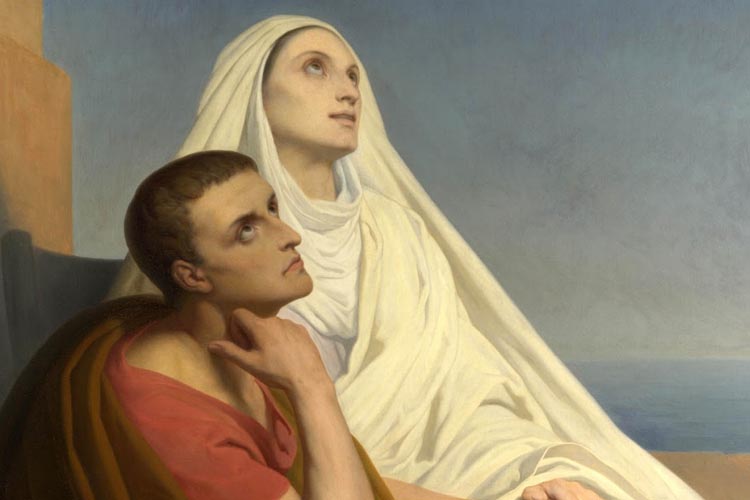Feast Day: 28 August
My life in St Augustine
Before coming to London, I lived in St. Augustine, Florida, where I was a parishioner at the Cathedral Basilica of St. Augustine, in the Diocese of St. Augustine.
Funny thing is, it was several years before I ever became familiar with the saint whose namesake was such a big part of my life.
My journey to know the saint began in high school, when I realized that I had a true passion for writing everything from essays to poetry. I learned to appreciate the beauty of the written word, finding myself drawn to works that were as imperfect and broken as I was (mostly counter-cultural and existential works of literature like On the Road by Jack Kerouac, The Stranger by Albert Camus, and the poetry of Richard Brautigan and Charles Bukowski).
My writing took on a similar style to these deep but dark authors and poets. I spoke from my heart when I wrote, but like the writers I loved, my heart was unsatisfied and empty.

Reading Augustine’s Confessions
I continued my education at Florida State University, where I studied English. I first encountered Saint Augustine of Hippo by complete coincidence. I was waiting to meet with one of the religious brothers at the Catholic Student centre at the university. I began browsing through a bookshelf in the student lounge at the church. It was there that I saw St. Augustine’s Confessions and picked it up to flip through while I waited. I started reading the first paragraph:
Great are you, O Lord, and exceedingly worthy of praise; your power is immense, and your wisdom beyond reckoning. And so we humans, who are a due part of your creation, long to praise you – we who carry our mortality about with us, carry the evidence of our sin and with it the proof that you thwart the proud. Yet these humans, due part of your creation as they are, still do long to praise you. You arouse us so that praising you may bring us joy, because you have made us and drawn us to yourself, and our hearts are restless until they rest in you.
I saw so much truth in what I read, particularly in that last sentence. I had a restless heart, an unsatisfied heart, a heart without joy. But to hear that it was made for God was something I’d never considered. To hear that God gave us the opportunity to praise as a way of bringing us joy was new to me. Here I had just casually picked up a book and I was experiencing so much in one paragraph alone. I made myself comfortable on a couch and became completely absorbed in Augustine’s words. Who was this man? How had I never encountered him before?
I kept reading.
You are most high, excellent, most powerful, omnipotent, supremely merciful and supremely just, most hidden yet intimately present, infinitely beautiful and infinitely strong, steadfast yet elusive, unchanging yourself though you control the change in all things, never new, never old, renewing all things yet wearing down the proud though they know it not; ever active, ever at rest, gathering while knowing no need, supporting and filling and guarding, creating and nurturing and perfecting, seeking although you lack nothing. You love without frenzy, you are jealous yet secure, you regret without sadness, you grow angry yet remain tranquil, you alter your works but never your plan; you take back what you find although you never lost it; you are never in need yet you rejoice in your gains, never avaricious yet you demand profits. You allow us to pay you more than you demand, and so you become our debtor, yet which of us possesses anything that does not already belong to you? You owe us nothing, yet you pay your debts; you write off our debts to you, yet you lose nothing thereby. After saying all that, what have we said, my God, my life, my holy sweetness? What does anyone who speaks of you really say?”
WOW. What does anyone say?
Kerouac and Brautigan had written beautifully about the world outside of themselves, but Saint Augustine wrote beautifully of the world inside – a world I had never given much thought. Augustine wrote of the soul, the desires of the heart, the longings and aching deep within for truth, and ultimately, the aching for God. He wrote of God as someone who resides within us, and we in Him. And even more, he wrote of his personal experiences of this loving God. I wasn’t reading a fiction story or empty imagery – I was reading the depths of a Roman’s heart from the late 300s A.D.
I was completely hooked.
About Saint Augustine of Hippo
Saint Augustine’s story is a relatable one. He was born into a middle class family. He was intelligent and driven, the son of a Christian woman (St. Monica) and a pagan, Patricius. His mother urged him in his faith, but he was rebellious and strong-willed, following worldly ambitions that were more important to him.
He invested himself in his education and pursued a career as a rhetor (a rhetor was much like a lawyer and professional speaker). Saint Augustine of Hippo was one of the greatest rhetors of his time. We even studied him in my Classical Rhetoric lecture class at Florida State University.

A life of extravagance and experimentation
In his youth, Augustine lived extravagantly, put his education and career first, fathered a child out of wedlock and had a common law marriage with the child’s mother for 15 years. His desire for truth led him to experiment with other religions, but he eventually ran into another influential rhetor of the time: Bishop Ambrose of Milan. The bishop befriended Augustine who began to see Christianity in a new light, but Augustine still struggled to hand over his heart in faith.
The conversion
Under a fig tree, Augustine had a powerful conversion where he heard the voices of children telling him to take up and read the bible. When he opened it, the passage was so relevant to the questions his heart was asking that he was convinced of God’s presence. The words allowed him to find the courage to pursue the God who was calling out to him. And for centuries after his death, Augustine’s words have done the same for people like me.
Confessions
Saint Augustine of Hippo provides one of the earliest personal accounts of conversion. In Confessions, we see the first man to reveal his human experience, with all the mistakes that came with it. Augustine of Hippo reveals a brokenness much more beautiful than what our world offers, because his brokenness comes with an extraordinary redemption. Augustine was lost and imperfect, but in Christ his restless heart found the solace and satisfaction it had always been seeking.
I would encourage anyone who doesn’t know Augustine of Hippo to consider reading Confessions. Augustine’s Confessions had something that Kerouac and Bukowski and every other writer I admired could never offer me – meaning. And without meaning, every work of art longs to be more than what it is.
